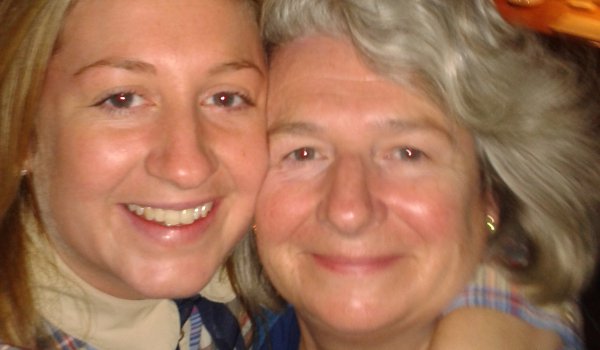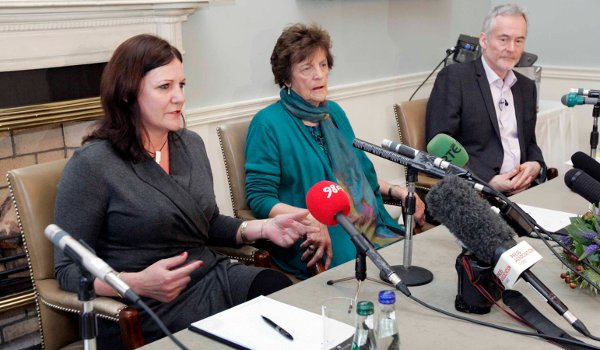Following the launch of the Philomena Project, a call on the Irish Government to release thousands of forced adoption files, The Irish Post shines a light on victims of the shocking practice in Britain.
THE CHURCH and Irish State must apologise for tearing apart thousands of families in brutal homes for unmarried mums, according to a Britain-based victim of forced adoption.
Grace Cushing was taken from the same Church-run Tipperary institution where Philomena Lee, whose life story has been adapted into Oscar-nominated film Philomena, was incarcerated.
But unlike Philomena’s son, who was sold to wealthy Americans, Ms Cushing was taken by a deprived Irish family living in Birmingham.
Now, after facing down nuns who lied to her about her past and being rejected by her birthmother, she says action must be taken to make up for the “distress” caused to victims of forced adoption.
“I just want it to be wholly acknowledged that this did actually happen and that it was wrong, not for people to say ‘no no, we needed to do it and we were doing the right thing’,” Norfolk-based Ms Cushing told The Irish Post.
“They were not doing the right thing. It was not right for anybody to be cast aside, because that is how it feels now. I would not give a dog away like that.”
Tens of thousands of children are believed to have been taken from their natural mums in Ireland between the 1920s and 1970s.
Campaigners claim some women were shouted at until they signed away their children to Church-run mother and baby homes, while in other cases adoption forms were forged.
Huge pressure was also put on women as nuns made them feel ashamed of getting pregnant outside marriage and told them adoption was their child’s only chance of a good upbringing.
But the majority of those children who were taken were given no information they could use to track down their natural families years later.
Ms Cushing, a mum-of-one, said not knowing anything about her identity has caused her life to be blighted by “some very down moments”.
 Grace Cushing (right) with her daughter Honey
Grace Cushing (right) with her daughter Honey“I think if children are going to be adopted like this they should be given a record,” she added.
“If you are going to haul babies off like that, you should give them something to go with, not just take an attitude of ‘off you go’.
“I have a grandchild now and I cannot even bear to let him out of my sight.”
But while many victims have lambasted the Church and the Irish State for their joint roles in separating families, Ms Cushing said she blames her mum for letting her go.
“I struggle to understand my mother’s actions, in whatever circumstance really,” she explained.
After years of trying to find her mum, Ms Cushing received an anonymous letter in response to a newspaper advert she took out giving her an address to write to.
But she then received a response from the address, which she believes came from her birthmother, asking her never to write again.
“She said she did not want anything to do with me,” Ms Cushing said.
“I feel quite emotional about that now. It was not very nice and it is still not very nice.
“She said her husband did not know and he was a quiet man and that her life had been hard. I thought ‘You think you have had a hard life?’”
But despite her bad experience of trying to find her family, Ms Cushing gave her backing to the Philomena Project.
The campaign, launched earlier this year by Philomena Lee, aims to pressure the Irish Government into releasing more than 60,000 files on adoption in Ireland.
Campaigners claim the move is essential to help reunite mothers and children who are currently refused information by state agencies for confidentiality reasons.
 Philomena Lee (centre) at the launch of the Philomena Project
Philomena Lee (centre) at the launch of the Philomena Project“I think it is important to get the chance to find your family because it is like closing a loop,” Ms Cushing said.
“I still would not mind meeting my mother and her family even though I would not want to form a relationship with her.”
She also called on the Irish Government to follow the example it set in the Magdalene Laundries scandal and compensate children taken from mother and baby homes because of the suffering forced adoption has caused victims.
As well as periods of depression, Ms Cushing has struggled all her life with everyday tasks like getting a passport and getting medical advice because she has no idea what conditions run in her natural family.
“But what I have always found even more difficult, today as much as when I was younger, is seeing people who are able to speak to their parents,” she said.
“That is always very hard.”
Ms Cushing also had to go through emotional battles with her adopted mother, a Kilkenny native, who did not her to try and trace her roots.
After discovering her name had been changed at her adoption from Geraldine Mary O’Sullivan, she was caused further distress when she was then lied to by nuns from the institution where she was born.
“I was told that they had nothing to do with it, that my mother had taken me with her from the home,” Ms Cushing explained.
“But she did not, because my adopted parents told me I was adopted from there.
“And then I got the adoption papers and saw that they were actually signed by these people. You just think ‘Why couldn’t you have just told me?’”

